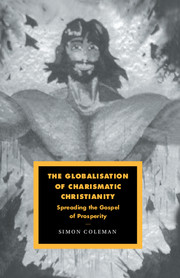Book contents
- Frontmatter
- Contents
- List of illustrations
- Acknowledgements
- Introduction
- Chapter One A ‘weird babel of tongues’: charisma in the modern world
- Chapter Two ‘Faith which conquers the world’: globalisation and charisma
- Chapter Three Sweden: national ‘state’ and global ‘site’
- Chapter Four The Word of Life: organising global culture
- Chapter Five Words: from narrative to embodiment
- Chapter Six Aesthetics: from iconography to architecture
- Chapter Seven Broadcasting the faith
- Chapter Eight Expansive agency
- Chapter Nine Contesting the nation
- Chapter Ten The Word and the world
- References
- Index
Chapter Five - Words: from narrative to embodiment
Published online by Cambridge University Press: 22 September 2009
- Frontmatter
- Contents
- List of illustrations
- Acknowledgements
- Introduction
- Chapter One A ‘weird babel of tongues’: charisma in the modern world
- Chapter Two ‘Faith which conquers the world’: globalisation and charisma
- Chapter Three Sweden: national ‘state’ and global ‘site’
- Chapter Four The Word of Life: organising global culture
- Chapter Five Words: from narrative to embodiment
- Chapter Six Aesthetics: from iconography to architecture
- Chapter Seven Broadcasting the faith
- Chapter Eight Expansive agency
- Chapter Nine Contesting the nation
- Chapter Ten The Word and the world
- References
- Index
Summary
Charismatic Christianity is a religion of the Word. Powerfully charged language is read, spoken, written, memorised, prophesied, translated, pinned up on signs in houses and cars, stripped of semantic meaning in glossolalia and, so it is believed, embodied not only in the flesh of Christ but also in that of his followers. Word of Life members sometimes refer to the Scriptures as their ‘spiritual weapon’, echoing the Pauline imagery of a sword superimposed on an open Bible that forms part of the group's logo. The sacred text is treated as an intimate possession to be taken with the person as he or she goes about their daily lives, and its margins are usually heavily scored with notes taken from sermons, classes and personal reflections. The group itself, located in an industrial zone, is akin to a verbal factory, responsible for the production of many millions of words a year in the form of taped sermons, books and magazines. Ritual practices, ranging from private devotions to collective prayers, are complemented by processes of material production in the conversion of static text into ‘living’, sacralised and widely broadcast words.
I shall concentrate here on some of the ways in which words relate to the formation of identity as a believer. The chapter moves from an examination of public narrative forms to an extended focus on how words appear to become embodied and materialised in the self and the environment.
- Type
- Chapter
- Information
- The Globalisation of Charismatic Christianity , pp. 117 - 142Publisher: Cambridge University PressPrint publication year: 2000



